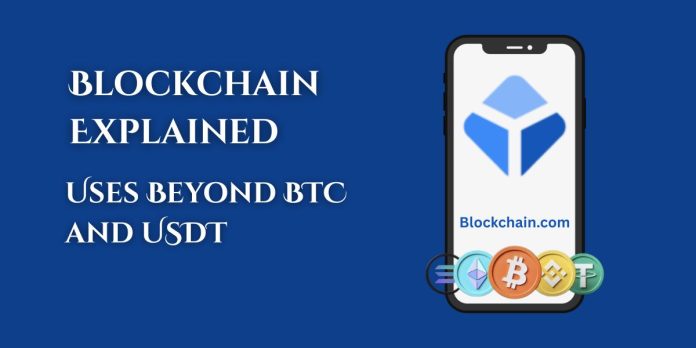When most people hear the word blockchain, they instantly think of Bitcoin (BTC) or stablecoins like Tether (USDT). While it’s true that these cryptocurrencies rely on blockchain technology, the real potential of blockchain goes far beyond just digital money.
Today, industries around the world are discovering new ways to apply blockchain for solving everyday problems—such as securing data, increasing transparency, and building trust. In this article, we’ll take a closer look at how blockchain works and how it’s being used in fields outside of crypto trading.
What Is Blockchain in Simple Terms?
At its core, blockchain is a digital ledger. It stores information in a series of blocks that are linked (or “chained”) together. Once data is added, it cannot be changed easily—making it very secure and trustworthy.
Each block holds a record of transactions or data entries. This data is shared across a network of computers, so no single entity controls it. This decentralized nature is one reason blockchain is trusted for recording important information.
Blockchain Is More Than Just Bitcoin
Bitcoin was the first major application of blockchain, but the technology has since grown into something much bigger. Platforms like Ethereum, Solana, and Avalanche now support smart contracts and decentralized apps (dApps), opening up endless possibilities.
Even if you already use crypto wallets or occasionally convert USDT to BTC on Blockchain, it’s helpful to understand what else blockchain can do—especially as it moves into mainstream industries.
Key Industries Using Blockchain Technology
1. Supply Chain and Logistics
Blockchain helps track products from the factory to the store. This is especially useful in industries like food, medicine, and retail where it’s important to confirm where something came from.
- In food safety, blockchain can trace the origin of a product quickly in case of contamination.
- In shipping, it reduces paperwork and speeds up customs processes.
2. Healthcare
Medical data is sensitive. With blockchain, patients can securely control who has access to their health records. Hospitals and doctors can also use it to avoid duplicate testing or errors.
- It improves patient privacy.
- It reduces fraud in medical billing.
3. Real Estate
Buying and selling property often involves a lot of paperwork and middlemen. Blockchain can simplify this with smart contracts—agreements that automatically execute when conditions are met.
- Speeds up property transactions.
- Helps prevent fraud in title records.
4. Digital Identity
Blockchain offers a safe way to store your digital identity. This can be used for online banking, passport verification, or age confirmation.
- Reduces risk of identity theft.
- Gives users control over their personal data.
5. Voting Systems
Some countries are testing blockchain-based voting to make elections more transparent and secure. Voter identities can be verified, and votes can be counted with less room for tampering.
The Rise of NFTs and Tokenization
Non-fungible tokens (NFTs) also use blockchain to prove ownership of digital assets like art, music, or even real estate. Beyond art, tokenization is being used to break down physical assets into digital shares that can be traded more easily.
This is changing how we view ownership, access, and investment in both the digital and physical world.
Blockchain in Finance (Beyond Just Coins)
Decentralized finance (DeFi) platforms now let users lend, borrow, and earn interest without a bank. These systems run entirely on blockchain and are open to anyone with a wallet.
And while cryptocurrencies remain central to DeFi, the systems themselves are bigger than any one coin.
If you’re unsure how to get started or face issues during a swap, don’t hesitate to Contact Blockchain Customer Care for useful guidance.
Future Outlook: What’s Next for Blockchain?
As blockchain continues to evolve, we can expect wider adoption in:
- Education (certificates and degrees on-chain)
- Energy (tracking carbon credits)
- Insurance (faster claim processing)
- Entertainment (artist royalties via smart contracts)
These applications show that blockchain isn’t just about trading—it’s about trust, transparency, and automation.
Final Thoughts
Blockchain technology is more than a platform for Bitcoin or USDT. It’s a system that’s transforming how we share, verify, and trust information. From medical records to voting, its real-world uses are growing fast.
So whether you’re exploring new ways to manage crypto or learning how to improve business with decentralized tools, blockchain is a technology worth paying attention to.
Latest Article:- Struggling with Shipping Delays? Try Consort Group’s Trusted Trucking Services in the USA!

